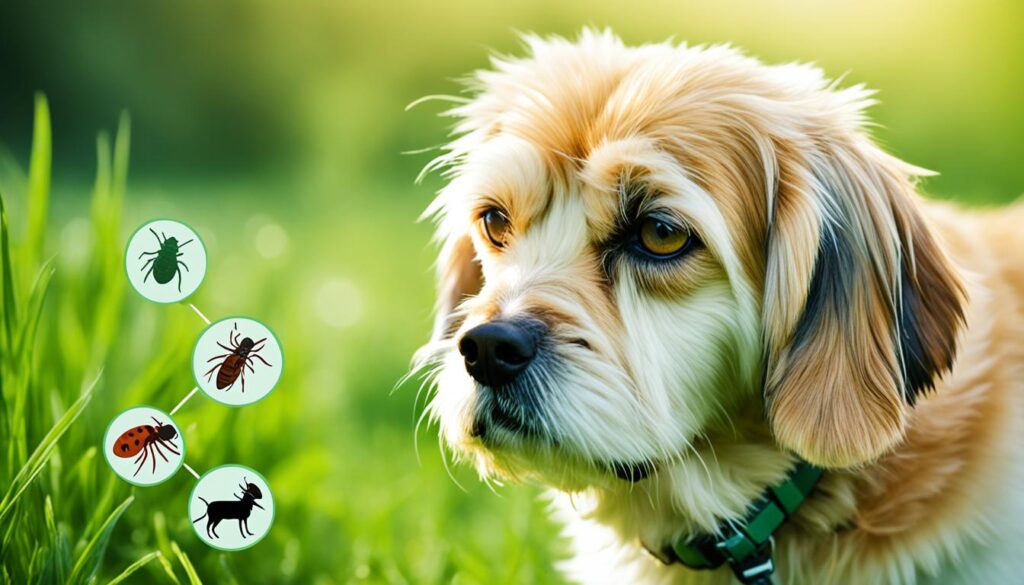At [Company Name], we believe that the health and wellness of your beloved pets should be a top priority. That’s why we have created this comprehensive guide to help you understand the importance of vaccinations and preventative care for your furry friends. By staying informed and taking proactive measures, you can ensure that your pets live long, healthy lives.
Vaccinations and preventative care play a crucial role in maintaining pet health and wellness. Annual check-ups, flea and tick prevention, heartworm and parasite prevention, and the administration of vaccines are all essential components of routine pet care. These measures not only protect your pets from preventable diseases but also contribute to their overall well-being.
In the following sections, we will delve into the significance of routine pet care, explore the dangers of skipping annual check-ups, provide valuable tips on how to prevent fleas and ticks, discuss the importance of heartworm and parasite prevention, and delve into the role of vaccines in protecting pets from diseases. We will also highlight the correlation between vaccinations and public health and offer advice on tailoring vaccination schedules to your pet’s lifestyle needs.
By implementing the pet health and wellness tips shared in this guide, you can keep your pets healthy, happy, and thriving. Let’s dive in!
Key Takeaways:
- Regular vaccinations and preventative care are essential for maintaining pet health and wellness
- Annual check-ups help detect underlying health issues early
- Flea and tick prevention measures protect pets from skin irritation and disease transmission
- Heartworm and parasite prevention safeguards against serious health complications
- Vaccinations play a crucial role in protecting pets from preventable diseases
The Importance of Routine Pet Care for Long-Term Health
Routine pet care is a crucial aspect of maintaining long-term pet health. By prioritizing regular check-ups and preventive measures, pet owners can ensure that their furry companions stay healthy and happy for years to come.
Why Skipping Annual Check-Ups Can Be Detrimental
Skipping annual check-ups for your pet can have serious consequences for their well-being. These check-ups allow veterinarians to thoroughly assess your pet’s overall health, detect any underlying issues, and provide necessary treatments. Without regular check-ups, potential health problems may go unnoticed, leading to more severe conditions down the line.
The Benefit of Scheduling Routine Care in Advance
Scheduling routine care in advance offers numerous benefits for both pet owners and their furry friends. By planning ahead, you can ensure that your pet receives necessary vaccinations, examinations, and preventive treatments on time. This proactive approach to pet care helps prevent the risk of diseases and other health complications, contributing to your pet’s long-term well-being.
Navigating Veterinary Service Delays Effectively
While routine pet care is essential, it’s important to acknowledge that veterinary service delays can be a common occurrence. However, with some strategic planning, you can effectively navigate these challenges. Consider scheduling appointments in advance, staying in touch with your veterinarian’s office, and exploring alternative veterinary clinics if necessary to ensure that your pet’s health is not compromised by service delays.
Regular routine pet care, including annual check-ups and preventive measures, plays a vital role in promoting long-term pet health. By not skipping annual check-ups, scheduling routine care in advance, and effectively navigating veterinary service delays, you can provide your beloved pet with the necessary care and support for a happy and healthy life.
Pet Health and Wellness Tips: Flea and Tick Prevention
Fleas and ticks are more than just annoying pests. They can pose a significant threat to the health and comfort of our beloved pets. These pesky parasites can cause skin irritation, transmit diseases, and even infest our homes. That’s why implementing effective flea and tick prevention measures is crucial in safeguarding our pets and maintaining their well-being.
To help you protect your furry friends from the dangers of fleas and ticks, we’ve gathered some valuable tips:
- Use topical or oral medications: There are various flea and tick prevention products available in the market, including spot-on treatments, collars, and oral medications. Consult with your veterinarian to determine the best option for your pet.
- Regular grooming practices: Brushing your pet’s fur and inspecting for any signs of fleas or ticks can help you identify and address the issue at an early stage. Additionally, keeping your pet’s coat clean and well-maintained can reduce the risk of infestation.
- Maintain a clean and pest-free environment: Vacuum your home regularly, paying special attention to areas where your pet spends most of their time. Wash their bedding frequently and consider using pet-safe flea and tick sprays to eliminate any potential critters.
By following these pet health and wellness tips for flea and tick prevention, you can ensure a safe and comfortable environment for your furry friend. Remember, prevention is key when it comes to keeping your pet parasite-free.

Comprehensive Pet Health Guide: Heartworm and Parasite Prevention
Parasites, such as heartworms, can pose a significant threat to your pet’s health and well-being. Heartworm disease, transmitted through mosquito bites, can cause severe heart and lung damage if left untreated. It’s crucial for pet owners to understand the dangers of heartworm disease and take proactive measures to prevent its occurrence.
The Dangers of Heartworm Disease in Pets
Heartworm disease can have devastating effects on pets. When mosquitos carrying heartworm larvae bite your pet, they transmit these parasites into their bloodstream. Over time, the heartworms grow and settle in the heart, lungs, and blood vessels, causing significant damage and potentially leading to heart failure or even death. Unfortunately, heartworm disease may not show obvious symptoms until it reaches an advanced stage, making early detection crucial.
Recommended Year-Round Preventative Measures
The best defense against heartworm disease is implementing year-round preventative measures. Administering monthly heartworm prevention medications prescribed by your veterinarian is an essential preventive step. These medications work by killing the immature heartworm larvae present in your pet’s body, preventing them from developing into adults. It’s important to administer the medication consistently, even during the colder months when mosquito activity may be reduced. Remember, heartworm prevention is far more affordable and less painful than treating a full-blown heartworm infection.
Additionally, regular veterinary check-ups are vital for detecting heartworm infection early. Your veterinarian may recommend conducting heartworm tests annually to ensure your pet remains free from heartworm disease.
How Preventative Care Shields Against Zoonotic Parasites
Preventative care not only protects your beloved pet but also shields against zoonotic parasites, which can pose risks to human health. Zoonotic parasites are infectious organisms that can be transmitted between animals and humans. By ensuring your pet receives comprehensive parasite control, including flea and tick prevention measures, you minimize the risk of zoonotic parasites entering your home and affecting your family’s health. Regularly check your pet for fleas and ticks, and consult with your veterinarian for the most effective parasite control options.
Implementing comprehensive pet health measures, such as regular heartworm prevention, parasite control, and maintaining good hygiene practices, is vital for keeping your pet safe from heartworm disease and other zoonotic parasites. By prioritizing preventative care, you are providing your pet with the best chance for a healthy and parasite-free life.
| Preventative Measures | Benefits |
|---|---|
| Administer monthly heartworm prevention medication as prescribed by your veterinarian | Prevents heartworm larvae from developing into adults, protecting your pet from heart and lung damage |
| Regular veterinary check-ups and heartworm testing | Allows for early detection and treatment of heartworm infection |
| Comprehensive parasite control, including flea and tick prevention | Minimizes the risk of zoonotic parasites and protects both your pet and your family’s health |
Vaccine Advocacy: Protecting Your Pets from Preventable Diseases
Vaccinations play a crucial role in protecting pets from preventable diseases. By understanding how vaccines work in pets, identifying core and non-core vaccinations based on your pet’s specific needs, and recognizing the role of vaccines in promoting pet longevity and quality of life, you can provide your furry companions with a solid defense against potentially life-threatening diseases.
Understanding How Vaccines Work in Pets
Vaccines work by stimulating the immune system to recognize and combat specific pathogens. When a pet is vaccinated, a small and harmless part of the pathogen or a weakened version of it is introduced into their body. This triggers an immune response, allowing the pet’s immune system to recognize and remember the pathogen. Therefore, if the pet is exposed to the actual disease-causing pathogen in the future, their immune system can respond quickly and effectively, preventing or reducing the severity of the disease.

Identifying Core vs. Non-Core Vaccinations for Your Pet
Core vaccinations are vaccines that are recommended for all pets due to their essential role in preventing highly contagious and potentially life-threatening diseases. These vaccinations protect against diseases that have a high prevalence, pose a significant risk to pets’ health, and can be easily transmitted to other animals or humans. Non-core vaccinations, on the other hand, are optional vaccines that may be recommended based on factors such as geographic location, lifestyle, and individual pet health risks.
The Role of Vaccines in Pet Longevity and Quality of Life
Vaccines play a crucial role in promoting pet longevity and quality of life. By protecting pets from preventable diseases, vaccines can help prevent illness, reduce the risk of complications, and save pet owners from costly veterinary treatments. Vaccinated pets are less likely to suffer from debilitating diseases, allowing them to live healthier and happier lives. Furthermore, vaccines also contribute to the overall well-being of the pet community by reducing the spread of diseases among animals.
Promoting Pet Health: The Significance of Vaccination Timing
Administering vaccines at the right age and intervals is crucial for promoting pet health and ensuring maximum protection against diseases. Vaccination timing plays a vital role in optimizing the effectiveness of vaccines and safeguarding the well-being of our furry friends. Understanding the importance of timely vaccinations and adhering to the recommended vaccination schedules provided by veterinarians is essential for pet owners.
By following the appropriate vaccination timeline, pet owners can provide their pets with the necessary immunity to combat preventable diseases. Early vaccination ensures that puppies and kittens receive protection from birth, as they may be susceptible to certain infections due to a developing immune system. It is essential to consult with a veterinarian to determine the appropriate vaccination schedule based on the specific needs of your pet.
Regular vaccinations not only protect individual pets but also contribute to the overall health of the pet population. By vaccinating our pets on time, we help prevent the spread of infectious diseases, ensuring a healthier community of animals.
Vaccination timing depends on various factors, including the age, breed, lifestyle, and existing health conditions of the pet. Veterinarians are well-equipped to provide guidance on the optimal timing for vaccinations based on these considerations. It is important to remember that timely vaccination not only protects our pets but also helps protect vulnerable populations, such as young animals and animals with compromised immune systems.
By keeping up with vaccination schedules, pet owners can actively contribute to the promotion of pet health and the prevention of diseases. Regular veterinary visits provide an opportunity to discuss vaccination timing with professionals who have expertise in pet care. They can provide personalized recommendations and address any concerns or questions regarding vaccination timing.
| Vaccine | Timing |
|---|---|
| Rabies | 12-16 weeks of age, then boostered annually or as recommended by veterinarian |
| Distemper, Hepatitis, Parvovirus (DHP) | 6-8 weeks of age, then boostered every 3-4 weeks until 14-16 weeks old |
| Leptospirosis | 12-16 weeks of age, then boostered annually or as recommended by veterinarian |
| Bordetella (Kennel Cough) | At least 2 weeks before potential exposure (e.g., boarding, grooming) |
| Influenza (Dog Flu) | Based on local prevalence, lifestyle, and risk factors. Discuss with your veterinarian. |
Timing matters when it comes to pet vaccinations. Providing the right doses of vaccines at the appropriate stages of a pet’s life ensures that they receive the maximum benefits and protection against diseases. By prioritizing vaccination timing and working closely with veterinarians, pet owners can actively contribute to the well-being of their beloved companions and the larger pet community.
Maintaining Pet Wellness: The Correlation Between Vaccinations and Public Health
Maintaining pet wellness goes beyond individual health benefits; it also directly affects public health. Vaccinations are a crucial aspect of pet care that plays a significant role in protecting not only the pets themselves but also the community at large. By vaccinating our pets, we contribute to the prevention and control of various diseases, including the important vaccine-preventable zoonotic disease, rabies.
Discussing Rabies: A Vaccine-Preventable Zoonotic Disease
Rabies is a highly dangerous viral disease that can affect all mammals, including humans. It is primarily transmitted through the bite of an infected animal and poses a significant public health risk. However, thanks to modern veterinary medicine and widespread pet vaccinations, rabies has become increasingly rare in domestic animals, and human cases have decreased significantly.
The Impact of Pet Vaccinations on Community Health
By ensuring our pets are up to date with their vaccinations, we are actively contributing to the overall health and well-being of our community. Vaccinated pets prevent the transmission of potentially deadly diseases to other animals, reducing the risk of outbreaks and protecting vulnerable populations such as unvaccinated or immunocompromised pets. This not only safeguard pets but also helps create safer and healthier communities.
Legal Requirements and Social Responsibilities of Pet Vaccinations
Vaccinations for pets are not only a matter of personal choice but also a legal requirement in many jurisdictions. Governments and local authorities impose mandatory vaccinations to protect public health and mitigate the spread of contagious diseases. By complying with these legal requirements, pet owners uphold their social responsibilities and contribute to the larger goal of community well-being.
| Vaccination | Legal Requirement | Recommended Interval |
|---|---|---|
| Rabies | Required by law in most jurisdictions | Every 1-3 years, as per local regulations |
| Core Vaccinations (e.g., Distemper, Parvovirus) | Not mandatory in all areas, but highly recommended | Every 1-3 years, as advised by the veterinarian |
| Non-Core Vaccinations (e.g., Bordetella, Lyme Disease) | Not mandatory, depends on factors such as lifestyle and regional risks | Varies based on specific vaccination and veterinarian’s recommendations |
As responsible pet owners, it is crucial to stay informed about the legal requirements for pet vaccinations in our area and ensure our pets receive the necessary immunizations to protect their health and the well-being of the community.
To summarize, pet vaccinations have a profound impact on both individual pet wellness and public health. By preventing the spread of diseases like rabies and adhering to legal vaccination requirements, pet owners play a vital role in promoting the well-being and safety of their beloved pets and the broader community.
Adapting Pet Wellness Tips: Tailoring Vaccination Schedules to Lifestyle Needs
When it comes to pet wellness, one size does not fit all. Every pet has unique lifestyle needs that should be taken into consideration when determining vaccination schedules. By tailoring these schedules based on individual lifestyles, pet owners can ensure that their furry friends receive the necessary protection against specific risks. Whether your pet frequently interacts with other animals, travels often, or is involved in certain activities, personalized vaccination schedules play a crucial role in maintaining their health and well-being.
To guide you in adapting pet wellness tips to suit your pet’s lifestyle, we offer the following recommendations:
- Consult with your veterinarian: Start by discussing your pet’s lifestyle, including their daily routines, social interactions, and potential exposure to disease risks. Your veterinarian will provide expert advice on the appropriate vaccinations and timing for your pet.
- Consider the level of exposure: Evaluate your pet’s level of interaction with other animals. If your pet frequently visits parks, daycare facilities, or dog shows, they may have a higher risk of exposure to contagious diseases. In such cases, additional vaccinations may be necessary.
- Travel plans and destination: If you plan to travel with your pet, especially to different regions or countries, research the specific diseases prevalent in those areas. Based on the recommendations of your veterinarian, adjust the vaccination schedule accordingly to protect your pet from region-specific risks.
- Activity-based risks: Certain activities, such as hiking, camping, or hunting, may expose your pet to environmental risks and potential contact with wildlife. Discuss these activities with your veterinarian to determine any additional vaccines that may be necessary to safeguard your pet’s health.
Remember, a tailored vaccination schedule not only protects your pet but also contributes to the overall well-being of your furry friend. By adapting these pet wellness tips to suit your pet’s lifestyle needs, you can ensure that they remain healthy, happy, and protected.

Pet Care Tips: The Unseen Value in Regular Veterinary Examinations
Regular veterinary examinations are an essential aspect of maintaining your pet’s health and well-being. These routine check-ups provide valuable insights into your pet’s overall condition and can detect hidden health issues that may not be immediately apparent. By prioritizing regular veterinary examinations, you can proactively address potential health problems before they become more serious.
How Physical Exams Reveal Hidden Health Issues
During a physical examination, a veterinarian will thoroughly assess your pet’s overall health, paying close attention to vital signs, body condition, and any abnormalities. This hands-on examination allows the veterinarian to detect subtle signs of illness or underlying health issues that may not be evident to pet owners. By observing your pet’s behavior, evaluating their body structure, and performing various tests, such as checking heart and lung function, the veterinarian can uncover hidden health issues that require attention.
The Imperative of Diagnostic Testing in Early Disease Detection
In addition to physical examinations, diagnostic testing plays a vital role in early disease detection. These tests, which may include bloodwork, urine analysis, and imaging techniques, provide a deeper understanding of your pet’s internal health and can uncover underlying conditions that may not be apparent during a physical exam. Through diagnostic testing, veterinarians can detect diseases in their early stages, allowing for prompt treatment and better outcomes. Early disease detection is crucial for ensuring the long-term health and well-being of your pet.
Oral Health and Its Influence on Your Pet’s Overall Well-being
Many pet owners underestimate the importance of oral health in pets. However, dental problems can have a significant impact on your pet’s overall well-being. Regular dental check-ups and cleanings are essential for preventing dental diseases such as periodontal disease and tooth decay, which can lead to pain, infection, and even organ damage. Maintaining good oral hygiene through regular veterinary dental exams and at-home dental care can contribute to your pet’s overall health and quality of life.

Prioritizing regular veterinary examinations, diagnostic testing, and oral health care are essential components of responsible pet ownership. By staying proactive and addressing your pet’s specific healthcare needs, you can ensure early disease detection and provide your furry friend with a healthy and happy life.
Conclusion
Summarizing Key Takeaways for Ensuring Optimal Pet Health
Understanding vaccinations and preventative care is vital for ensuring optimal pet health. Throughout this comprehensive guide, we have explored the importance of routine pet care, including annual check-ups, flea and tick prevention, heartworm and parasite prevention, and the role of vaccines in protecting pets from preventable diseases.
By summarizing the key takeaways from each section, pet owners can reinforce their knowledge and commitment to keeping their pets healthy. Regular veterinary examinations, timely vaccinations, and preventive measures such as flea and tick control are all crucial in maintaining a pet’s overall well-being.
Encouraging Proactive Pet Wellness Strategies
As responsible pet owners, it is essential to develop proactive pet wellness strategies. This includes tailoring vaccination schedules to suit your pet’s individual lifestyle needs, such as their interactions with other animals or participation in specific activities. By taking a personalized approach to pet care, you can ensure that your furry friend receives the necessary protection against specific risks.
Additionally, maintaining good oral hygiene for your pet and scheduling regular veterinary examinations are vital aspects of proactive pet wellness. Oral health plays a significant role in your pet’s overall well-being, and regular check-ups allow for the early detection and treatment of potential health issues.
Final Advice on Partnering with Veterinarians for Your Pet’s Care Journey
Partnering with veterinarians throughout your pet’s care journey is crucial. These professionals provide expert guidance, administer necessary vaccinations and treatments, and offer valuable advice on pet care. By establishing a strong partnership with a trusted veterinarian, you can ensure the highest level of care for your pet.
Remember to follow the recommended vaccination schedules provided by your veterinarian and to stay proactive in seeking their guidance. Whether your pet requires routine care or is facing specific health concerns, veterinarians play an integral role in maintaining and enhancing their well-being.
By implementing these proactive pet wellness strategies and partnering with veterinarians, you can provide your beloved companion with the optimal level of care. Prioritizing regular check-ups, timely vaccinations, and preventive measures will help ensure the overall health and happiness of your furry friend for years to come.
FAQ
What is the importance of routine pet care for long-term health?
Routine pet care, including annual check-ups and preventive measures, is essential for promoting long-term pet health. Regular veterinary visits allow for early disease detection and treatment, helping to prevent serious health complications.
Why is skipping annual check-ups detrimental to my pet’s well-being?
Skipping annual check-ups can have detrimental effects on your pet’s well-being as underlying health issues may go undetected and untreated. Scheduling routine care in advance ensures that your pet receives the necessary vaccinations, examinations, and preventive treatments on time.
How can I navigate veterinary service delays effectively?
Veterinary service delays are common, so pet owners should be proactive in navigating these challenges. By scheduling appointments in advance and staying in communication with your veterinarian, you can ensure that your pet’s health is not compromised.
What are some pet health and wellness tips for flea and tick prevention?
To prevent fleas and ticks, you can use topical or oral medications, maintain regular grooming practices, and keep a clean and pest-free environment for your pet. These measures are crucial in safeguarding your pets from the discomfort and health risks associated with fleas and ticks.
What are the dangers of heartworm disease in pets?
Heartworm, transmitted through mosquito bites, can cause heart and lung damage in pets if left untreated. It is crucial to implement year-round preventative measures to protect your pet from this potentially life-threatening disease. Additionally, preventive care also helps shield against other zoonotic parasites that can pose a risk to human health.
How can I protect my pet from preventable diseases through vaccination?
Vaccinations play a crucial role in protecting pets from preventable diseases. Understanding how vaccines work in pets, identifying core and non-core vaccinations based on your pet’s specific needs, and following a vaccination schedule are essential for promoting pet longevity and quality of life.
What is the significance of vaccination timing?
Timing is crucial when it comes to pet vaccinations. Administering vaccines at the right age and intervals ensures that pets receive maximum protection against diseases. By adhering to recommended vaccination schedules provided by veterinarians, you can effectively promote the health and well-being of your pets.
How do pet vaccinations contribute to public health?
Pet vaccinations not only protect individual pets but also contribute to public health by preventing the spread of diseases such as rabies, which is a vaccine-preventable zoonotic disease. By ensuring your pet is up to date on vaccinations, you are playing a role in promoting both your pet’s well-being and the health of your community.
Can I tailor vaccination schedules based on my pet’s lifestyle?
Yes, every pet has unique lifestyle needs. You can adapt pet wellness tips to tailor your pet’s vaccination schedule based on their specific lifestyle. Whether your pet frequently interacts with other animals, travels, or is involved in specific activities, personalized vaccination schedules ensure they receive the necessary protection against specific risks.
Why are regular veterinary examinations important for pet wellness?
Regular veterinary examinations provide valuable insights into your pet’s overall health and well-being. Physical exams can reveal hidden health issues, and diagnostic testing plays a role in early disease detection. Additionally, maintaining good oral health is also essential for your pet’s overall well-being.
Source Links
- https://www.avma.org/resources-tools/pet-owners/petcare/vaccinations
- https://vcahospitals.com/know-your-pet/preventive-health-care-guidelines-for-dogs
- https://www.animalhumanesociety.org/resource/why-routine-preventative-care-your-pet-essential

